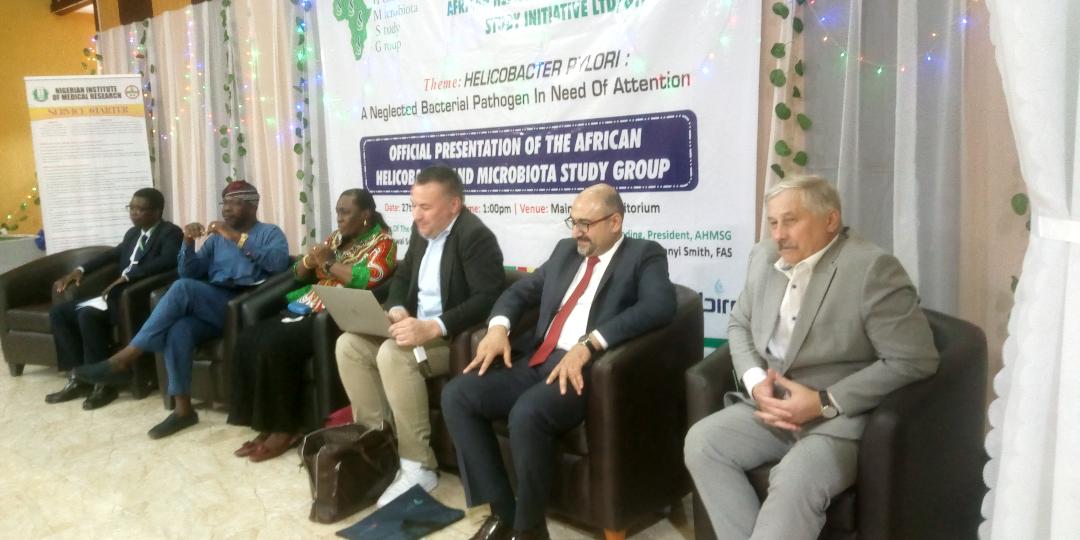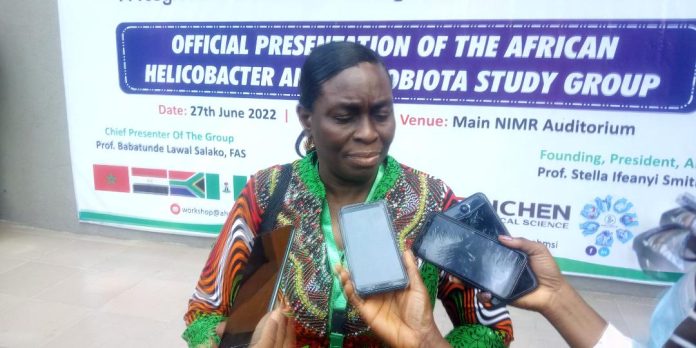By Gideon Adonai
Health experts have lamented that a newly identified bacterial pathogen ravaging 50 percent of the world population, is receiving less attention in Africa.
This study was revealed during the initiative programme of the African Helicobacter and Microbiodata Study Group (AHMSG), which was held on Monday at the Nigerian Institute of Medical Research.
The study led by Stella Smith, a Professor of Medical Microbiology, confirmed that H.pylori affects more than 50 percent of the world population.
At the event themed “Helicobacter Pylori”, Prof Smith, said that the disease, “previously known as Campylobacter pylori, is a gram-negative, microaerophilic, spiral (helical) bacterium usually found in the stomach.”
Prof. Smith, who is also the founding president of the AHMSG, said the bacterium was first identified in 1982 by the Australian doctors, Barry Marshall and Robin Warren.
Speaking on how to tackle the bacteria, Prof Smith urged African leaders to wake up to the dangers H-pylori poses to its citizenry.
She said, “What I want to tell the government is that although H-pylori is neglected, generally in Africa, not only in Nigeria, we decided to fill in that gap because we know that Helicobacter pylori infection is real.
“It actually causes gastritis, as well as some percentages of gastric cancer. Our research is to try and focus on what we believe H-pylori research will bring to bear in Africa.
“So, whatever research we’re doing is not just Nigeria alone. We’re working towards general living, improvement of diagnosis, (because that’s another problem) the treatment as well as management of Helicobacter pylori”, she added.
Further highlighting the dangers of H-pylori, the African-based scholar said the disease causes gastric cancer.
“You know that anything that causes cancer is not anything you need to play out with. The World Health Organization, 1994 called it a class one carcinogen. So it actually causes cancer”, she said.
“And in countries where gastric cancer cases get as high as 5 percent, one is usually at risk of time in the long run. So we need to nip the issues of proper diagnosis of Helicobacter pylori in the bud.
“So we can look at the culture because if you don’t culture you probably don’t know the exact treatment to give the organism. So our group is going to conduct in-depth research on the Helicobacter pylori diagnosis, treatment, and management in Africa”, Prof Smith added.
Also, another expert, Dr. Mohammed Alboraie, said all hands must be on deck to curb the deadly effect of H-pylori on Africans.
Dr. Alboraie, a research scholar of internal medicine and gastroenterology at Al-Azhar University, Cairo, Egypt, disclosed that his group is making available unique solutions to gastric disorders, especially H-pylori.
He said “African researchers have come together to proffer solutions to Africa because other countries may have different types of resistance patterns and bacteria to the antibiotics.
“In Africa, we didn’t have a group that studies the bacteria affecting the stomach. So, we gathered here to offer some solutions, customised to African countries. For example, the economy in Africa is different from that in Europe or America.
“Also, the antibiotics present here may not be the same as that in America or Europe. Some antibiotics are available in America and Europe and they are not available here [Africa].
“Some antibiotics are effective in our population in Africa which may not be active in Europe and America.
“Also, regarding the diagnosis of the disease, we may use other forms of diagnostic tests which may be suitable and effective in Africa, but not in America and Europe.
“The bacteria has different strengths and resistance and that’s why we are studying our population in Africa and studying the effectiveness of the drugs here and proffer the best solutions for our population.”

Left to right, is Professor John Akinyomi, Mountain Top University, representing Vice-Chancellor, Prof Elijah Ayanlabi; Professor Salako Babatunde, Director General of Nigerian Institute of Medical Research (NIMR), Professor Stella Smith, President of African Helicobacter & Microbiodata Study Group (AHMSG), Dr. Christian Schulz, member of European Helicobacter and Microbiota Study Group (EHMSG), Maximilian University, Munich, Germany, Dr. Mohammed Alboraie, Secretary-General of AHMSG, Department of Internal Medicine, gastroenterology unit, Al-Azhar University, Cairo, Egypt; Professor Mārcis Leja is Professor of Medicine, Director of the Institute of Clinical and Preventive Medicine, University of Latvia.


















